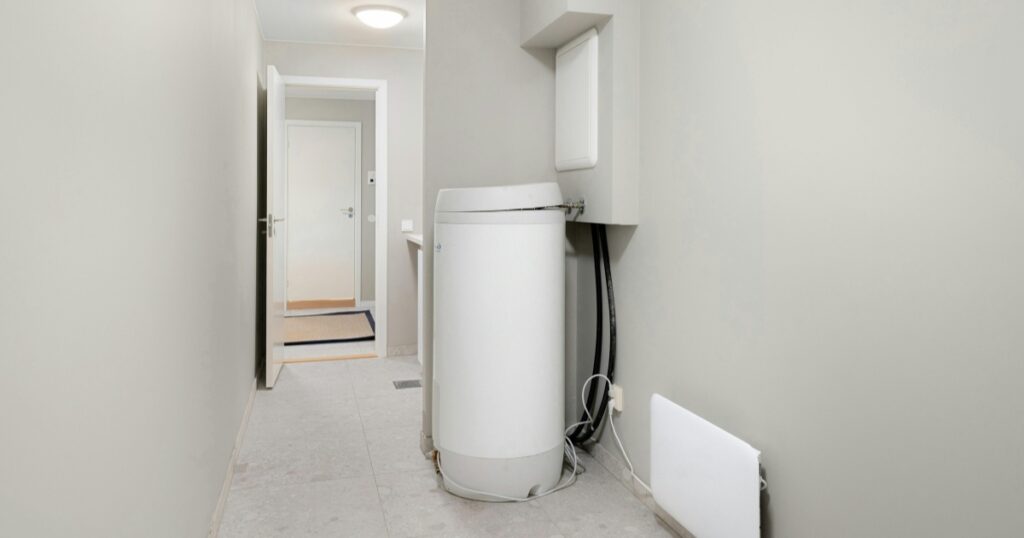We’ve all been there, haven’t we? Enjoying a nice, steamy shower when suddenly – brrr! – it’s like the Antarctic has relocated to your bathroom. It’s enough to make you want to have a good old whinge.
But here’s something exciting: did you know that by 2030, sticking with an old-school gas water heater could hit your wallet harder than a footy final ticket? Our yarn today is about the latest in hot water tech that’s not just going to keep your showers delightfully toasty but will also be kinder to your pocket and our beautiful environment.
Ready for showers that are warm as a sunny arvo at Bondi Beach? The future’s looking up, and it’s piping hot!
Key Takeaways
- Heat pump technology is a game-changer for saving energy and money, using air or ground warmth to heat water far more efficiently than traditional systems.
- By adopting renewable energy hot water services like solar and hydrogen-powered systems, homeowners can cut emissions in half by 2030 and enjoy long-term savings.
- Government incentives are available to Australians who upgrade to eco-friendly hot water systems, making it easier to invest in sustainable home improvements.
- Advancements in water heater technology not only promise reduced running costs and environmental benefits but also add value to properties with their modern sustainability features.
- With an eye on the future, hydrogen-powered hot water solutions could revolutionise residential heating by offering clean, efficient, and stable energy alternatives.
Current State of Hot Water Service Technology
The current state of hot water service technology is facing challenges in terms of energy consumption and environmental impact. Electric and natural gas water heating systems are the most common, but they are not the most efficient or environmentally friendly options available.

Energy consumption
We’re all using more energy than ever before to heat our water, and the costs are adding up. Traditional electric and natural gas water heaters have been hitting our pockets hard. But it’s not just about money; these older systems use a lot of energy, which can strain our power grids and environment.
Switching to energy-efficient hot water systems like heat pump technology is making a real difference. These innovative solutions sip rather than gulp electricity, leading the charge in reducing high power bills.
Heat pumps pull warmth from the air or ground to heat water, slashing energy use remarkably compared to conventional methods. It’s no wonder that these units are becoming more popular; they represent clever tech that helps us save on running costs while caring for the planet.
Environmental impact
Solar hot water systems and heat pump technology play a crucial role in reducing emissions and boosting grid stability. The increasing popularity of solar hot water systems aligns with the push towards renewable energy, indicating a promising future for sustainable water heating.
As homeowners, embracing these advancements can not only reduce our environmental footprint but also contribute to cost savings in the long run while supporting the shift towards cleaner energy sources.
Advancements in heat pump hot water systems offer energy-efficient solutions that can significantly impact our carbon footprint. By transitioning towards electric systems and embracing these technologies, we can actively participate in building a more sustainable future for hot water service technology.
Embracing Heat Pump Technology
Heat pump systems are revolutionising water heating technology with their energy efficiency and environmental benefits. They are a game-changer for providing hot water more sustainably.
Advantages of heat pump systems
Heat pump systems offer significant advantages for homeowners. They provide energy-efficient solutions that can lead to long-term cost savings, reduce greenhouse gas emissions, and contribute to a sustainable future. Here are the key benefits of heat pump systems:
- Energy Efficiency: Heat pump systems are highly efficient, utilising ambient air temperature to heat water, which can result in lower energy consumption and reduced utility bills.
- Environmental Impact: These systems have a lower environmental impact compared to traditional water heaters, as they utilise renewable energy sources such as air or geothermal heat, reducing carbon emissions.
- Cost Savings: Homeowners can benefit from potential long-term cost savings due to the energy efficiency of heat pump systems, leading to reduced operational expenses over time.
- Versatility: Heat pump systems can also provide cooling capabilities in addition to heating water, offering a versatile solution for home comfort needs.
- Reliability: With advancements in technology, modern heat pump systems offer reliable performance and durability, ensuring a consistent hot water supply for households.
- Government Incentives: Many governments provide incentives and rebates for installing energy-efficient heat pump water heaters, making it an attractive option for homeowners looking to upgrade their hot water systems.
- Long-Term Investment: Investing in a heat pump system is not only beneficial for immediate cost savings but also adds value to the property by showcasing a commitment to sustainability and environmental responsibility.
- Minimal Maintenance: Modern heat pump systems require minimal maintenance compared to traditional water heaters, offering convenience and peace of mind for homeowners.
- Quiet Operation: These systems operate quietly, providing a comfortable living environment without noisy disruptions commonly associated with conventional water heaters.
A game-changer for water heating
With the advancements in heat pump technology, homeowners can expect a significant game-changer for water heating. By embracing heat pump systems, hot water service technology is set to revolutionise energy efficiency and cost-effectiveness.
This innovative approach not only ensures reduced emissions but also offers substantial benefits in boosting grid stability. As we transition towards a cleaner future, the role of heat pumps as a game-changer for water heating cannot be underestimated, promising an environmentally sustainable solution for home hot water needs.
The shift towards electric systems and the increasing popularity of energy-efficient solutions like heat pumps culminate in a promising future for hot water service technology. With ongoing development in renewable energy and efficiency, the future holds exciting prospects for more eco-friendly and cost-effective water heating options.
Environmental Impact and Benefits
Reduced emissions and increased grid stability are just a few of the environmental benefits of embracing heat pump technology for hot water service. This advancement in technology not only saves energy but also contributes to a cleaner, more sustainable future.
Reduced emissions
Switching to energy-efficient hot water systems can play a key role in reducing emissions and your overall environmental impact. By embracing heat pump technology or transitioning towards hydrogen-powered systems, you can significantly decrease your carbon footprint and contribute to a cleaner future for our planet.
With the potential to halve emissions by 2030, renewable energy solutions for hot water service technology are not only environmentally friendly but also cost-effective in the long run.
As homeowners, being mindful of the environmental benefits of these advancements is crucial in making informed decisions that positively impact both your household and the world around you.
Boosting grid stability
Transitioning from the focus on reduced emissions to boosting grid stability, homeowners need to recognise that advanced water heating technologies play a significant role in stabilising the power grid.
With the increasing adoption of heat pumps and hydrogen-powered hot water systems, these innovative technologies offer not only energy-efficient solutions but also contribute to managing peak electricity demands, ultimately enhancing grid stability.
By leveraging these cutting-edge hot water service advancements, homeowners can actively support a more reliable and stable energy infrastructure while reducing their environmental impact.
As renewable energy continues to revolutionise the future of hot water technology, adopting state-of-the-art systems at the residential level directly supports broader initiatives aimed at ensuring equitable access to sustainable and resilient power supply.

The Future: Hydrogen-Powered Systems
Transitioning towards a cleaner future, hydrogen-powered hot water systems play a crucial role in energy sustainability. As we look ahead, these innovative systems offer promising potential in revolutionising the way we heat water and contribute to environmental conservation.
Transition towards a cleaner future
We can anticipate a transition towards a cleaner future as hot water service technology progresses. The integration of heat pump systems and the potential for hydrogen-powered hot water systems holds promise in reducing emissions and embracing energy sustainability.
With renewable energy set to play a significant role, the future of hot water technology is moving towards electric systems, indicating a shift away from traditional gas methods. Additionally, advancements in heat pump hot water systems are offering energy-efficient solutions that contribute to this transition.
Hydrogen-powered systems are expected to further impact the industry’s environmental footprint positively by promoting cleaner energy sources and boosting grid stability. As we look ahead, embracing these evolving technologies will be essential for homeowners seeking sustainable and cost-effective alternatives in their approach to hot water service.
Role in energy sustainability
Hydrogen-powered hot water systems play a crucial role in energy sustainability. They are a key part of the clean energy transition, offering a promising alternative to traditional gas and electric water heaters.
By harnessing hydrogen as a fuel source, these systems contribute to reducing emissions and promoting energy efficiency, aligning with the global push for more sustainable practices in residential heating technology.
Moving towards renewable sources like hydrogen is an essential step in ensuring long-term environmental benefits and minimising our carbon footprint. As we continue to explore innovative solutions, embracing hydrogen-powered hot water systems will be integral to shaping a more sustainable future for home heating technology.
Hot Water Technology Advancements
The advancements in hot water technology are revolutionising building operations and providing numerous benefits for facility managers. With the latest trends in water heaters, boilers, and HVAC systems, homeowners can expect more energy-efficient and environmentally friendly options for their hot water needs.
Impact on building operations
Hot water technology advancements have a significant impact on building operations. Energy-efficient hot water systems, such as heat pumps and hydrogen-powered units, are revolutionising facility management for hot water technology.
These innovations offer benefits such as reduced energy consumption, lower emissions, and enhanced grid stability. Facility managers need to stay updated on the latest trends in water heaters, boilers, and HVAC systems to ensure efficient building operations and cost savings.
The integration of high-efficiency units for hot water technology presents opportunities for facility managers to enhance their building operations. With advancements in heat pumps and hydrogen-powered hot water systems gaining momentum, there is a growing focus on energy sustainability and improved operational efficiency.
Benefits for facility managers
Facility managers benefit from advancements in water heating technology and HVAC systems:
- Managing energy costs becomes more efficient with high-efficiency units, aiding in long-term savings.
- Advanced technology allows for easier monitoring and control of water heating systems, providing improved operational efficiency.
- Renewable energy integration reduces environmental impact and aligns with sustainability goals.
- Up-to-date facilities management knowledge on water heaters and boilers ensures smooth building operations and minimal downtime.
- Trending solar hot water systems present opportunities for incorporating cost-effective renewable energy solutions into building operations.
- Enhanced grid stability through innovative hot water technology supports a more resilient infrastructure.
Trends in water heaters, boilers, and HVAC systems
After understanding the benefits for facility managers, it’s essential to stay updated on the latest trends in water heaters, boilers, and HVAC systems. Here are some noteworthy insights:
- High-efficiency units for water heating technology are gaining traction and surprising long-term users of legacy water heaters.
- There is a notable shift towards electric hot water systems as part of the future of hot water service technology.
- Solar hot water systems are becoming increasingly popular, reflecting a promising future for solar hot water technology.
- Advancements in heat pump hot water systems are contributing significantly to energy-efficient solutions in the field of hot water service technology.
- The ongoing development in technology and focus on renewable energy and efficiency promise a bright future for the field of water heaters.
Dive into the Future
The future of hot water service technology is exciting. Innovations in heat pump systems and hydrogen-powered solutions are leading the way to a more sustainable future. With a focus on energy efficiency and reduced emissions, the shift towards electric and renewable technologies promises significant benefits for both homeowners and the environment.
As advancements continue to emerge, the trajectory of water heating technology looks promising for a cleaner, more efficient future.






